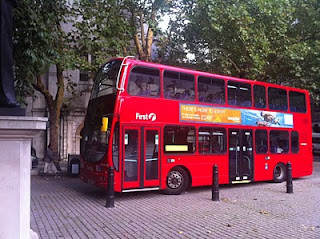 |
| A First London VNW in the courtyard of St Clement Dane's Church in London at the Public Transport Workers' Service of Thanksgiving |
How to start - last weekend we had the Tour of Britain Cycle Race London stage and time trial taking place in the centre of town. During this week we announced a further initiative on roadworks in London with the Mayor launching it at Palestra, and then today there was the annual Public Transport Workers' Service of Thanksgiving at St Clement Danes' Church in Central London organised by Winston Dottin.
I am going to major on the last one as it represents a powerful occasion in which staff come together to celebrate their multi-cultural past and express their hopes for the future.
It was of course in the early 1950s that London Transport sought people from the West Indies to fill vacancies at operating and engineering grades. Today the Revd David Tudor gave a tremendous sermon in which he charted the conditions which these British passport holders from the West Indies arrived in Britain. They were less surprised by the weather than they were by the reaction of some to their arrival.
Yet they formed the backbone of London's transport operating staff and many achieved very long service over the years.
For my part I told the congregation that in 2012 once again Londoners will rely on its transport workers to deliver and also that they will be supported by the entire extended TfL family.
Next year is full of big events - the Queen's Diamond Jubilee starts the summer off before we get into the Olympic Games and London will be full of people throughout.
Everyone, those people relying on public transport to get to the venues, to work or for recreation, will rely on London's transport staff. Today's event reminded us that London does so every day. They do during bad weather, they did during the civil unrest only a few weeks ago and they will during the whole of 2012.
....



